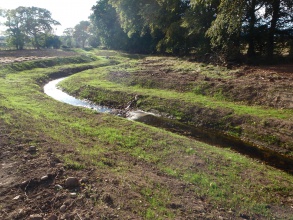Case study:Burn of Balmaleedy Restoration, Marykirk: Difference between revisions
No edit summary |
No edit summary |
||
| Line 26: | Line 26: | ||
• To reduce flood risk in and around Marykirk | • To reduce flood risk in and around Marykirk | ||
The Burn of Balmaleedy Restoration Project has been undertaken by Aberdeenshire Council. SEPA's Water Environment Fund has also contributed by providing some of the funding | The Burn of Balmaleedy Restoration Project has been undertaken by Aberdeenshire Council. SEPA's Water Environment Fund has also contributed to the problem by providing some of the funding. | ||
}} | }} | ||
{{Image gallery}} | {{Image gallery}} | ||
Revision as of 13:55, 27 January 2015
This case study is pending approval by a RiverWiki administrator.
Project overview
| Status | In progress |
|---|---|
| Project web site | |
| Themes | Flood risk management |
| Country | Scotland |
| Main contact forename | Richard |
| Main contact surname | Bryan |
| Main contact user ID | User:Rbryan |
| Contact organisation | Aberdeenshire Council |
| Contact organisation web site | http://www.aberdeenshire.gov.uk |
| Partner organisations | |
| Parent multi-site project | |
| This is a parent project encompassing the following projects |
No |
Project summary
This is a summary of a project undertaken by Aberdeenshire Council to restore a section of the Burn of Balmaleedy, upstream of the village of Marykirk. The restoration aims to restore the natural fluvial morphology of the section of the burn to reduce sediment mobilisation and transport, bringing benefits for flood management in the local area.
The Burn of Balmaleedy is a small tributary of the River North Esk. The burn flows roughly 3km southwest from its source into Marykirk, where it passes through two culverts under the A937. It then flows a further 1km along a low gradient section to the south to join the main river. From anecdotal evidence, a 300m section of the watercourse was previously straightened in the mid-late 1990’s. The canalised section of the burn exhibited a steep gradient, accelerating flows through the reach, resulting in channel incision (down to a depth of 3m) and bank erosion. This led to an increased amount of sedimentation occurring downstream in Marykirk, particularly around the A937 culverts and in the low gradient section of the watercourse. As a result, the conveyance of the channel has been greatly reduced, increasing flood risk in Marykirk and to the A937.
The project aims are:
• To restore the natural fluvial morphology of a previously straightened 300m section of the Burn of Balmaleedy
• To reduce the mobilisation and downstream transportation of sediment
• To reduce flood risk in and around Marykirk
The Burn of Balmaleedy Restoration Project has been undertaken by Aberdeenshire Council. SEPA's Water Environment Fund has also contributed to the problem by providing some of the funding.
Monitoring surveys and results
Lessons learnt
Image gallery
|
Catchment and subcatchment
Site
Project background
Cost for project phases
Reasons for river restoration
Measures
MonitoringHydromorphological quality elements
Biological quality elements
Physico-chemical quality elements
Any other monitoring, e.g. social, economic
Monitoring documents
Additional documents and videos
Additional links and references
Supplementary InformationEdit Supplementary Information
| ||||||||||||||||||||||||||||||||||||||||||||||||||||||||||||||||||||||||||||||||||||||||||||||||||||||||||||||||||||||||||||||||||||||||||||||||||||||||||||||||||||||||||||||||||

